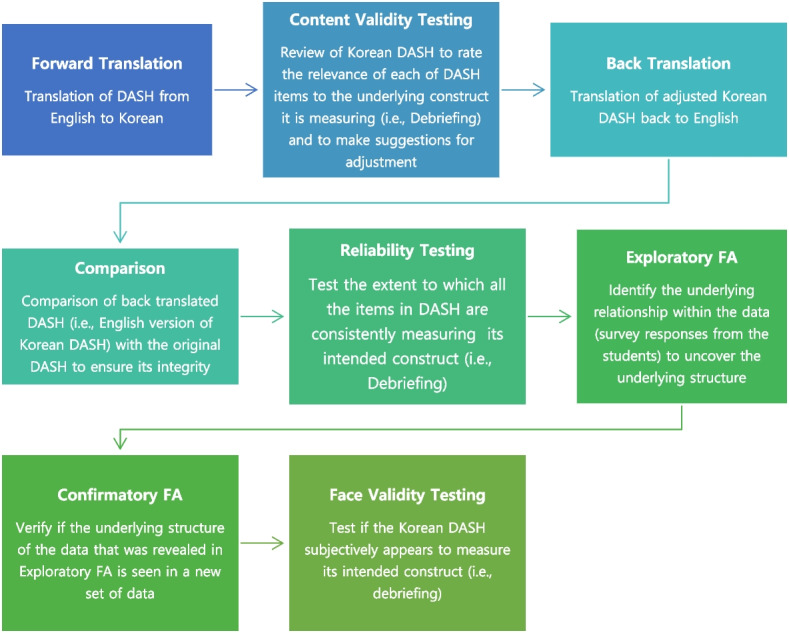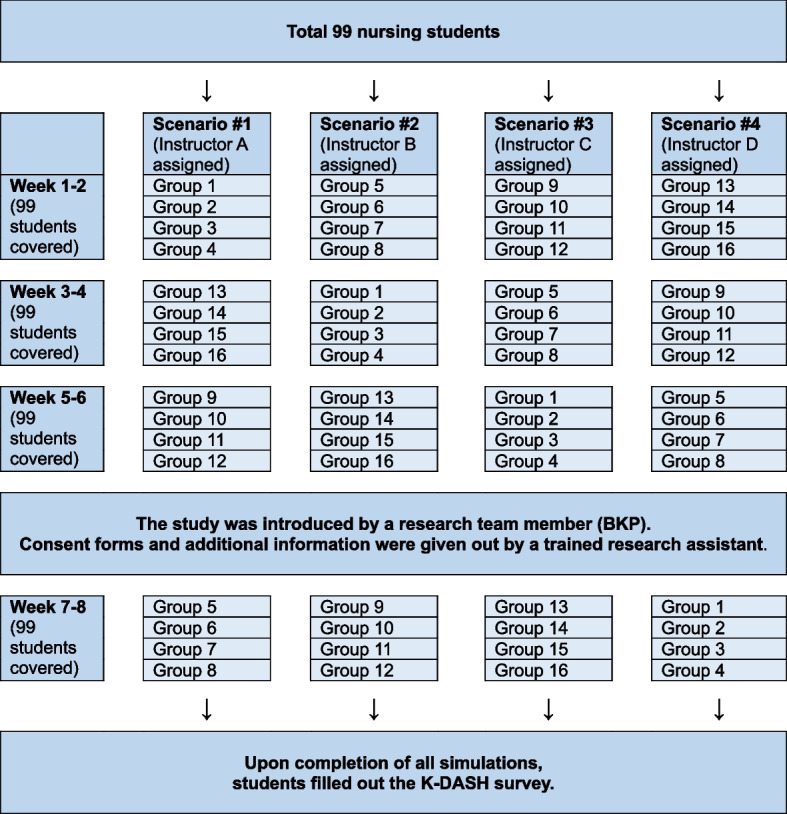Seon-Yoon Chung, Bu Kyung Park, Myoung Jin Kim, Jenny W Rudolph, Mary Fey, Robert Simon
下载PDF
{"title":"测试韩国版医疗保健模拟汇报评估(K-DASH)的可靠性和有效性。","authors":"Seon-Yoon Chung, Bu Kyung Park, Myoung Jin Kim, Jenny W Rudolph, Mary Fey, Robert Simon","doi":"10.1186/s41077-024-00305-3","DOIUrl":null,"url":null,"abstract":"<p><strong>Background: </strong>Use of the Debriefing Assessment for Simulation in Healthcare (DASH<sup>©</sup>) would be beneficial for novice debriefers with less or no formal training in debriefing. However, the DASH translated into Korean and tested for psychometrics is not yet available. Thus, this study was to develop a Korean version of the DASH student version (SV) and test its reliability and validity among baccalaureate nursing students in Korea.</p><p><strong>Methods: </strong>The participants were 99 baccalaureate nursing students. Content validity using content validity index (CVI), construct validity using exploratory factor analysis (EFA) and confirmatory factor analysis (CFA), and internal consistency using Cronbach's alpha coefficient were assessed.</p><p><strong>Results: </strong>Both Item-CVIs and Scale-CVI were acceptable. EFA supported the unidimensional latent structure of Korean DASH-SV and results of CFA indicated 6 items converged within the extracted factor, significantly contributing to the factor (p ≤ .05). Items were internally consistent (Cronbach's α = 0.82).</p><p><strong>Conclusion: </strong>The Korean version of the DASH-SV is arguably a valid and reliable measure of instructor behaviors that could improve faculty debriefing and student learning in the long term.</p>","PeriodicalId":72108,"journal":{"name":"Advances in simulation (London, England)","volume":"9 1","pages":"32"},"PeriodicalIF":4.7000,"publicationDate":"2024-08-08","publicationTypes":"Journal Article","fieldsOfStudy":null,"isOpenAccess":false,"openAccessPdf":"https://www.ncbi.nlm.nih.gov/pmc/articles/PMC11308559/pdf/","citationCount":"0","resultStr":"{\"title\":\"Testing reliability and validity of the Korean version of Debriefing Assessment for Simulation in Healthcare (K-DASH).\",\"authors\":\"Seon-Yoon Chung, Bu Kyung Park, Myoung Jin Kim, Jenny W Rudolph, Mary Fey, Robert Simon\",\"doi\":\"10.1186/s41077-024-00305-3\",\"DOIUrl\":null,\"url\":null,\"abstract\":\"<p><strong>Background: </strong>Use of the Debriefing Assessment for Simulation in Healthcare (DASH<sup>©</sup>) would be beneficial for novice debriefers with less or no formal training in debriefing. However, the DASH translated into Korean and tested for psychometrics is not yet available. Thus, this study was to develop a Korean version of the DASH student version (SV) and test its reliability and validity among baccalaureate nursing students in Korea.</p><p><strong>Methods: </strong>The participants were 99 baccalaureate nursing students. Content validity using content validity index (CVI), construct validity using exploratory factor analysis (EFA) and confirmatory factor analysis (CFA), and internal consistency using Cronbach's alpha coefficient were assessed.</p><p><strong>Results: </strong>Both Item-CVIs and Scale-CVI were acceptable. EFA supported the unidimensional latent structure of Korean DASH-SV and results of CFA indicated 6 items converged within the extracted factor, significantly contributing to the factor (p ≤ .05). Items were internally consistent (Cronbach's α = 0.82).</p><p><strong>Conclusion: </strong>The Korean version of the DASH-SV is arguably a valid and reliable measure of instructor behaviors that could improve faculty debriefing and student learning in the long term.</p>\",\"PeriodicalId\":72108,\"journal\":{\"name\":\"Advances in simulation (London, England)\",\"volume\":\"9 1\",\"pages\":\"32\"},\"PeriodicalIF\":4.7000,\"publicationDate\":\"2024-08-08\",\"publicationTypes\":\"Journal Article\",\"fieldsOfStudy\":null,\"isOpenAccess\":false,\"openAccessPdf\":\"https://www.ncbi.nlm.nih.gov/pmc/articles/PMC11308559/pdf/\",\"citationCount\":\"0\",\"resultStr\":null,\"platform\":\"Semanticscholar\",\"paperid\":null,\"PeriodicalName\":\"Advances in simulation (London, England)\",\"FirstCategoryId\":\"1085\",\"ListUrlMain\":\"https://doi.org/10.1186/s41077-024-00305-3\",\"RegionNum\":0,\"RegionCategory\":null,\"ArticlePicture\":[],\"TitleCN\":null,\"AbstractTextCN\":null,\"PMCID\":null,\"EPubDate\":\"\",\"PubModel\":\"\",\"JCR\":\"Q2\",\"JCRName\":\"HEALTH CARE SCIENCES & SERVICES\",\"Score\":null,\"Total\":0}","platform":"Semanticscholar","paperid":null,"PeriodicalName":"Advances in simulation (London, England)","FirstCategoryId":"1085","ListUrlMain":"https://doi.org/10.1186/s41077-024-00305-3","RegionNum":0,"RegionCategory":null,"ArticlePicture":[],"TitleCN":null,"AbstractTextCN":null,"PMCID":null,"EPubDate":"","PubModel":"","JCR":"Q2","JCRName":"HEALTH CARE SCIENCES & SERVICES","Score":null,"Total":0}
引用次数: 0
引用
批量引用



 求助内容:
求助内容: 应助结果提醒方式:
应助结果提醒方式:


